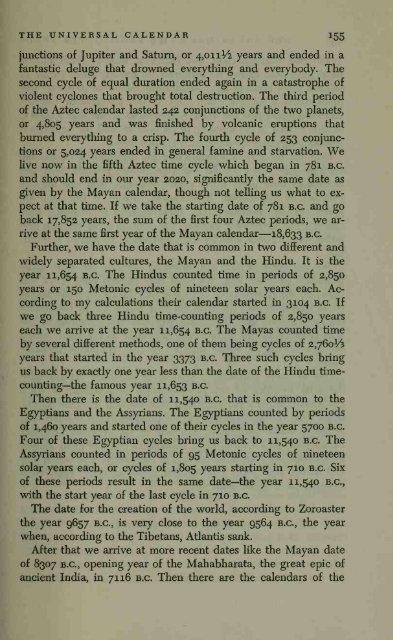You also want an ePaper? Increase the reach of your titles
YUMPU automatically turns print PDFs into web optimized ePapers that Google loves.
THE UNIVERSAL CALENDAR<br />
I55<br />
junctions of Jupiter and Saturn, or 4,01 1V2 years and ended in a<br />
fantastic deluge that drowned everything and everybody. The<br />
second cycle of equal duration ended again in<br />
a catastrophe of<br />
violent cyclones that brought total destruction. The third period<br />
of the Aztec calendar lasted 242 conjunctions of the two planets,<br />
or 4,805 years and was finished by volcanic eruptions that<br />
burned everything to a crisp. The fourth cycle of 253 conjunctions<br />
or 5,024 years ended in general famine and starvation. We<br />
live now in the fifth Aztec time cycle which began in 781 b.c.<br />
and should end in our year 2020, significantly the same date as<br />
given by the Mayan calendar, though not telling us what to expect<br />
at that time. If we take the starting date of 781 B.C. and go<br />
back 17,852 years, the sum of the first four Aztec periods, we arrive<br />
at the same first year of the Mayan calendar— 18,633 B.C.<br />
Further, we have the date that is common in two different and<br />
widely separated cultures, the Mayan and the Hindu. It is the<br />
year 11,654 b.c. The Hindus counted time in periods of 2,850<br />
years or 150 Metonic cycles of nineteen solar years each. According<br />
to my calculations their calendar started in 3104 b.c. If<br />
we go back three Hindu time-counting periods of 2,850 years<br />
each we arrive at the year 11,654 b.c. The Mayas counted time<br />
by several different methods, one of them being cycles of 2,760^^3<br />
years that started in the year 3373 b.c. Three such cycles bring<br />
us back by exactly one year less than the date of the Hindu timecounting—the<br />
famous year 11,653 b.c.<br />
Then there is the date of 11,540 b.c. that is common to the<br />
Egyptians and the Assyrians. The Egyptians counted by periods<br />
of 1,460 years and started one of their cycles in the year 5700 b.c.<br />
Four of these Egyptian cycles bring us back to 11,540 b.c. The<br />
Assyrians counted in periods of 95 Metonic cycles<br />
of nineteen<br />
solar years each, or cycles of 1,805 years starting in 710 b.c.<br />
of these periods result in the same date—the year 11,540 B.C.,<br />
with the start year of the last cycle in 710 b.c.<br />
The date for the creation of the world, according to Zoroaster<br />
the year 9657 b.c, is very close to the year 9564 B.C., the year<br />
when, according to the Tibetans, Atlantis sank.<br />
After that we arrive at more recent dates like the Mayan date<br />
of 8307 B.C., opening year of the Mahabharata, the great epic of<br />
ancient India, in 7116 B.C. Then there are the calendars of the<br />
Six

















